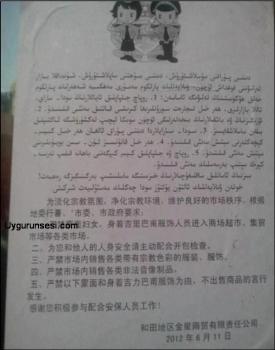New rules issued by Hotan company discriminate against Uyghur women

For immediate release
June 21, 2012, 3:30 pm EST
Contact: Uyghur American Association +1 (202) 478 1920
In line with an official security clampdown taking place in Hotan, a local company that leases property to businesses in the city has banned women wearing either jilbab[1] or veils from entering its shops and markets, and has restricted the sale of clothing with “religious characteristics” as well as the sale of “illegal audiovisual materials” from its property. The Hotan Prefecture Jinxing Trading Co., Ltd. posted a notice regarding the new restrictions on June 11, 2012, in front of an entrance to one of the shops on its property, stating that the restrictions were in accordance with the demands of prefectural and municipal Party and municipal government authorities. The notice clearly targets the wearing of clothing by local Uyghur women and their observance of their Islamic faith, as well as the sale of Uyghur videos and music deemed to fall outside of the Communist Party line. It also indicates that in addition to carrying out discrimination against Uyghurs’ Islamic faith itself, the Chinese government also actively encourages Chinese companies to do the same.
The Hotan company’s notice informs readers that the regulations are being instituted “in order to dilute the religious atmosphere, purify the religious environment, and maintain order in the marketplace.” It states that patrons are required to open their bags for a security check upon entering the company’s shops and marketplaces. In addition, it states that individuals may not use the new restrictions on the wearing of “religious clothing” as an excuse to stop selling their products at the company’s properties.
The notice constitutes an attack on religious freedom in East Turkestan, and blatantly discriminates against Uyghur Muslims, in particular Uyghur women. The Chinese Constitution forbids the discrimination of citizens based upon their religious beliefs. In addition, Article 18 of the International Covenant on Civil and Political Rights (ICCPR), which China has signed but not ratified, protects the freedom of religion and belief.
The new restrictions come in the wake of house-to-house searches, announced on June 7, 2012, that local authorities planned to carry out in the Gujanbagh [Chinese: Gujiangbage] neighborhood of Hotan. They also follow the police raid of an “illegal” religious school for children in the regional capital of Urumchi, the death of a Uyghur child in police custody for studying Islamic prayer in the city of Korla, and the sentencing of nine Uyghur men in the city of Kashgar for their involvement with “illegal religious schools” or religious instruction. Chinese security officials frequently intensify security crackdowns and restrictions on religion on the eve of sensitive anniversaries, and the region is due to mark the third anniversary of turbulent unrest in Urumchi on July 5.
Chinese authorities have launched numerous campaigns on women wearing headscarves and men wearing beards, in an attempt to dilute Uyghurs’ adherence to their Muslim beliefs. In addition, no one under the age of 18 can enter a mosque in East Turkestan; university and school students are forbidden from praying on campus, even in their dormitories; and students are prohibited from fasting during Ramadan. In recent years, restrictions on Uyghurs’ adherence to the Islamic faith have increasingly been codified into Chinese law, criminalizing peaceful religious practices among Uyghurs on par with illicit and violent criminal activity.
See also:
- China police begin house searches in restive Xinjiang
- Uyghur Jailed Over Religious Materials
- Notice informs locals of mandatory residence searches in Hotan community; police reserve the right to “use force” to enter homes
- Raid on Hotan religious school reflects brutality of official Chinese policies amid crackdown on religion in East Turkestan
[1] The jilbab is a type of clothing worn by many Muslim Uyghur women that covers the head and body while leaving the face open.
